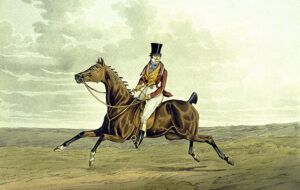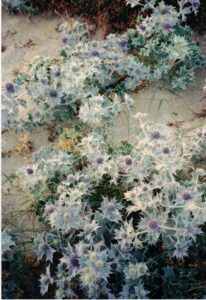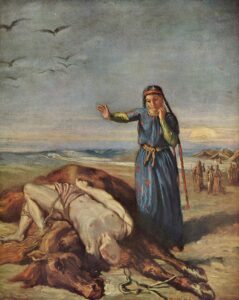
Engraving by George Hunt, 1823
It was a grey day for the horseback ride on the sandy dunes of the Lido, but the Venetian churches and palazzi were etched against the pearly sky and the wind blew hard through the horses’ manes and tails, also ruffling the hair of the two men in a wild and free way.
“Did I say too much in favor of this, Darcy? How are you faring?”
“No indeed, it is as delicious a ride as I have ever known. Though I must admit Shelley’s poem adds much to it.”
“Ah! You think so, do you?” And Byron rolled out some of the lines of Julian and Maddalo:
“I rode one evening with Count Maddalo
Upon the break of land which breaks the flow
Of Adria toward Venice: a bare strand
Of hillocks, heap’d from ever shifting sand…”
Darcy was not to be outdone. “Yes, very fine,” he said enthusiastically, and proceeded to recite his own
favorite stanza from memory:
“This ride was my delight. I love all waste
And solitary places; where we taste
The pleasure of believing what we see
Is boundless, as we wish our souls to be…”
“Well, I must say. Do you mean that you have committed a whole work of my rival’s to your mind and remember not a jot of my own works?”
“I did not know you and Shelley were rivals. I thought you were friends. And I do have my favorite parts of your poems by heart; it is just that this one of Shelley’s is so very apropos, reflecting the very moment we are experiencing.”
“So it does. It evokes so many rides and races my friend and I have had here, in the closest companionship. So I delight all the more in showing the same to one who can appreciate it.”
“I do that! The wildness of the sands, the magic city one one side, and the glittering Adriatic on the other. The curious vegetation – those grey-green flowers – what are they?”
“Sea-holly, I believe. In England. Agrifoglio di mare here.”

Sea Holly in the Scilly Isles
“I love the barrenness, the wildness, of this narrow strip of Paradise, as it were. So few structures, yet how ancient they are, with what untold history!”
“Yes, I do not believe the Lido has altered much this thousand years. It serves as a barrier to whoever may come across the Adriatic to threaten Venice.”
“I can see the fortifications, some of them are most curious.”
“Indeed. When the ladies arrive we will show them some of the peculiarly quaint octagonal islands made for cannons. I don’t know where else anything of the sort has ever been constructed.”
“I thought we were to see the old cemeteries.”
“Yes, the Jewish and the English ones. Placed here because such people cannot be buried in consecrated ground. We shall meet the ladies there, and have our pic-nic there, on the stones, as befits such reprobates.”
“I do not pretend to speak for myself, but my wife is no reprobate, I assure you.”
“Certainly not, your Elizabeth is a very angel, uniting wit, beauty and all the virtues,” Byron assured him, “but I cannot say as much for my inamorata.”
“I suspect you care for the Contessa more than you incline to admit.”
“Your guess is a true one,” Byron admitted sheepishly, slowing his horse down to a walk. “What will you say if I tell you that I am done with libertinism for good and all? Can you believe she has done that much for me?”
“I am not sure I should suppose that is true.”
“But it is. I have sickened myself with my profligacy. No, this with Teresa will be my last adventure. I hope never to attract any one else, nor to be drawn in again.”
“I hope for your sake that this should be so, and you live a more regular life henceforth. It will be much better for you.”
“You shall see; all the world will. I mean to devote myself henceforth entirely to my writing, and perhaps do a little good in the world for other people; and to lead a quiet domestic life with only Teresa.”
“Will not her husband be some obstacle to that course of action?”
“You do not know the Italians,” Byron said carelessly, “all that is arranged, in a most civilized system than we know in England. I will be with Teresa quite as much as I, or she, could wish.”
“Forgive me, if I am impertinently curious – but what qualities in her have made the difference, and caused you to forsake all others?”
Byron looked thoughtful, and held the reins loosely. “I do not quite know. She is a good little thing, without inconvenient morals, yet sincere in adoring me, and has not a bad mind of her own – you may think she is a silly girl, but she has been given a good education, read the philosophers and the poets. It has not made her a blue stocking however, and her chatter is diverting. I should say that most of all she enjoys life – and love – and me.”
“Well, that is surprising, but I can understand it better now. I see you are quite serious.”
“I am never quite serious, but do find myself nearly approaching the state here. By the way, I am grateful to you for not objecting to your wife coming into contact with my mistress.”
“Not at all. We are not in England now, and when in Rome, you know. Neither Mrs. Darcy nor I would wish to disport ourselves in the Italian manner, but we both prefer to keep an open mind.”
“Thank you. You are a lucky man, as I have observed before.”
“I hope you will be fortunate, too,” Darcy said kindly.
“Not likely, in this lifetime, which I expect to be sordid and short; but at this moment I feel up to any thing. Oh, now, there are some famous dunes ahead – shall we race up them for a last gallop before we turn around and ride back to the hut at Alberoni? We have just time.”
“I should like it of all things.”
They urged their horses up the ascent and after a long hard run, paused a moment on top the highest dune, to view the island vista.
“What a day of wild beauty,” Darcy breathed.
Byron pointed out the small island lying between the Lido and Giudecca. “There, that is the prison island mentioned in Shelley’s poem.”
“Listen well, if you hear not a deep and heavy bell,” Darcy intoned.
“Yes, the madhouse and the belfry tower,” replied Byron. “What a story it is, and only one of thousands in these islands.”
“No wonder you are drawn back here for these rides, and imaginings.”
“They do inspire me well, and I thank you for taking a part with your comradeship. As a matter of fact, I have used the wild horses in my present work – about the Ukrainian prince, Mazeppo, who falls in love with a Teresa of his own, but her husband has him dragged by wild horses on a long, terrible punishment…”
“My word! That shall surely be a drama for the ages!”

“A melodrama, I fear, but hope it rakes in that kind of financial reward, at any rate. I will have Murray send it to you when it is out, though he is a rogue and who knows what else he will append to the volume.”
“It will be greatly enjoyed at Pemberley this winter,” Darcy said graciously. “Ought we to ride back down now?”
“Yes, we must conclude our ride, for there you see down below, the gondola is approaching,” Byron pointed out.
The seated ladies discerned the riders at the same moment, and waved with enthusiasm as the two riders made their way down the dunes swiftly, and raced up to the hut that served as a stable. They dismounted and handed the horses over to the stable man just as the gondola tied up on the sandy shore.
Byron and Darcy clambered into the gondola and happily rejoined their ladies, who both seemed relieved to see them safe after their wild ride.
“You are safe, mio Byron, you had not a fall from horse?” Teresa asked anxiously.
“You know I never do,” he assured her, “And Mrs. Darcy surely knows what a masterful rider her husband is. He never gives her cause to worry.”
“Ah! e fortunata. I worry. You are not frightened of i cavalli?”
“Horses? No,” she replied. “I did worry about some things when we first came to Venice, perhaps; you must not think me entirely fearless. But Mr. Darcy’s riding was never one of them.”
“Much more than i cavalli, I fear only to lose l’amore del mio Byron,” the Contessa said sentimentally.
“Did you fear brigands, or cut-throats, or wicked poets?” Byron asked Elizabeth hastily.
“No, your Lordship. Mr. Collins considers this a city of evil and danger, I believe, but I have always felt quite safe here, and enjoyed all the poetical adventures we have had together.”
“And they are not over yet,” said Byron. “We will be at San Nicola in a few minutes, and you shall explore the tombs, to your heart’s content.”
The Contessa expostulated in Italian too rapid to follow, but both Darcy and Elizabeth perceived that she did not favor seeing the tombs, but clearly preferred to have the pic-nic first.
“Oh very well,” Byron agreed, “A meal is never unwelcome after such a gallop as we have had.”
“Or our brave and beautiful adventure floating across the lagoon,” Elizabeth contributed.
The menservants were directed to carry out the baskets and arrange the food upon some stone tables in the lovely garden surrounding the cemetery. An old overgrown vineyard, with a fenced wood, looked over the ancient gravestones that stood up among the thick grass, sheltered by old cypress trees, with light from the glittering lagoon shining through the canopy of leaves.
It was a fine pic-nic spread on capodimonte china and linen napkins, featuring among other things roast pheasants, bigoli pasta with anchovies, grilled polenta, vegetables alla judia (in honor of the cemetery, Byron said), soft-shelled crabs, rosettes of bread, a fruity Taleggio cheese, and much fine wine. The party did full justice to the viands, and lounged on the sands under the trees eating luscious black grapes as the sun went down in a glorious picturesque wash of pink and gold.
The Contessa remarked, in her peculiar brand of half Italian and half English, that it was getting dark and she was most positively, definitely, wanting her bed.
“Yes, the bed must not be long neglected,” said Byron easily. “And it is growing late, you can hear the bells clear across from the Giudecca.”
“That loud one tolling, it is from the madhouse,” Darcy told Elizabeth.
“The one in the poem?”
“Yes, Byron has been telling me about it.”
“What a mixture of the beautiful and the dreadful this place is,” said Elizabeth with a little shiver, settling her shawl around her in the evening chill.
“It might be worse. If we stay out much longer I may be inclined to give you a bit from a frightful piece I have written, just fit to be read out in a cemetery – all about creatures called Vampyres, who suck the blood,” Byron said conversationally.
“If it does not offend your lordship,” said Elizabeth, “I believe I should rather be excused from that. I prefer my last memory of the charms of Venice to be a beautiful and happy one – this pic-nic of ours at the tomb on the sands.”
“And our wild ride,” said Darcy, with a little bow to Byron.

3 comments
A reformed Byron? I wonder if it will affect his poetry! I do love that Darcy and Elizabeth totally adore each other.🥰❤️🥰 they obviously loved being away from certain other members of the party 😉
Hi Glynis, yes I think a good time was had by all! Teresa Guiciolli was apparently Lord Byron’s last “serious attachment,” but I don’t know that he ever actually went in for reformation!
What a surprising friendship between Darcy and Byron! Thanks for this scene, Diana. Your descriptions helped me feel as if I were there, riding alongside them!